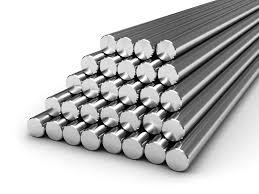Stainless Steel Bars: Types, Applications, and Benefits

Stainless steel bars are essential in various industries due to their durability, strength, and excellent corrosion resistance. Available in multiple shapes, sizes, and grades, stainless steel bars offer versatility for manufacturing, construction, and engineering projects. In this blog, we will explore the different types of stainless steel bars, their applications, and the benefits they provide.
What Are Stainless Steel Bars?
Stainless steel bars are long, solid pieces of stainless steel with a uniform cross-section. They are typically manufactured in different shapes, including round, square, flat, and hexagonal. Stainless steel bars are made from alloys containing chromium, nickel, and other elements, which give them their signature corrosion resistance and strength.
Common Types of Stainless Steel Bars
-
Stainless Steel Round Bars
Round bars are the most common type, used across various industries due to their versatility. These bars have a circular cross-section and are ideal for shafts, frameworks, supports, and fasteners. Round bars are commonly used in machinery and construction projects. -
Stainless Steel Square Bars
Square bars have a square cross-section, offering excellent structural integrity. They are often used in applications where strength and uniformity are required, such as in construction, fabrication, and manufacturing. -
Stainless Steel Flat Bars
Flat bars have a rectangular cross-section, making them ideal for projects requiring a flat surface or edge. These bars are commonly used in structural supports, braces, and frames. Flat bars are also useful for decorative purposes due to their smooth finish. -
Stainless Steel Hexagonal Bars
Hex bars have a six-sided cross-section and are commonly used in fasteners, fittings, and other applications where a tight grip is required. The hexagonal shape makes them ideal for wrenching applications, providing easy handling and increased torque.
Stainless Steel Bar Grades
Different grades of stainless steel bars offer varying properties and performance. Here are some of the most common grades:
-
SS 304: This is one of the most widely used grades due to its excellent corrosion resistance, formability, and weldability. SS 304 bars are commonly used in general-purpose applications, including construction, food processing, and chemical industries.
-
SS 316: Known for its enhanced corrosion resistance, especially in harsh environments, SS 316 is often used in marine, chemical, and pharmaceutical industries. The addition of molybdenum improves its resistance to chlorides and acids.
-
SS 410: SS 410 offers high strength and hardness but has lower corrosion resistance compared to SS 304 and SS 316. It is typically used in applications that require high strength, such as pump shafts, valve parts, and fasteners.
-
SS 420: This grade is known for its excellent wear resistance and hardness, making it suitable for applications such as cutlery, surgical instruments, and blades.
Applications of Stainless Steel Bars
1. Construction and Architecture
Stainless steel bars are widely used in the construction industry for structural support, reinforcing frameworks, and aesthetic designs. Their strength, durability, and resistance to weathering make them ideal for both indoor and outdoor construction projects.
2. Automotive and Aerospace
In the automotive and aerospace industries, stainless steel bars are used to manufacture components that require high strength, such as shafts, gears, and fasteners. Their corrosion resistance ensures long-term durability in challenging environments, including exposure to moisture and chemicals.
3. Food and Beverage Industry
Stainless steel bars are commonly used in the food and beverage industry for manufacturing equipment such as conveyors, mixers, and storage tanks. The corrosion resistance of stainless steel ensures that the equipment remains hygienic and easy to clean, making it suitable for food processing and packaging.
4. Marine Applications
Due to their excellent resistance to saltwater and corrosion, stainless steel bars are used in marine applications, including boat fittings, shafts, and anchors. SS 316 bars are especially favored for their ability to withstand the harsh conditions of marine environments.
5. Manufacturing and Engineering
In manufacturing and engineering, stainless steel bars are used to create precision components such as machine parts, fasteners, and tools. Their strength and machinability make them a preferred choice for producing high-quality, durable products.
6. Medical Devices
Stainless steel bars are also used in the medical industry to create surgical instruments, implants, and medical devices. The biocompatibility, corrosion resistance, and strength of stainless steel make it a reliable material for medical applications.
Benefits of Stainless Steel Bars
1. Corrosion Resistance
Stainless steel bars offer exceptional resistance to rust, corrosion, and oxidation, making them suitable for use in harsh environments. This property ensures long-lasting performance, even in applications exposed to moisture, chemicals, and extreme temperatures.
2. High Strength and Durability
Stainless steel bars have high tensile strength, making them ideal for applications that require structural integrity and resistance to wear and tear. Their durability ensures that they can withstand heavy loads and mechanical stress without deforming or breaking.
3. Low Maintenance
Stainless steel bars are easy to maintain due to their resistance to corrosion and wear. They do not require frequent maintenance, repairs, or replacements, reducing downtime and operational costs in industrial applications.
4. Aesthetic Appeal
Stainless steel bars have a sleek, polished appearance that adds a modern and professional look to any application. They are often used in architectural projects and decorative designs due to their aesthetic appeal and ability to maintain a clean, smooth finish.
5. Versatility
Available in a variety of shapes, sizes, and grades, stainless steel bars can be customized to suit a wide range of applications. This versatility allows them to be used across diverse industries, from construction to healthcare.
6. Environmentally Friendly
Stainless steel is a recyclable material, and using stainless steel bars can contribute to sustainability efforts. Recycling stainless steel reduces waste and conserves natural resources, making it an eco-friendly option for industries focused on environmental responsibility.
Conclusion
Stainless steel bars are a vital component in various industries, offering strength, durability, and corrosion resistance. Whether used in construction, automotive, marine, or food processing, stainless steel bars provide reliable performance in demanding environments. By selecting the appropriate grade and type of stainless steel bar, industries can ensure optimal results for their specific applications.

